**otherwise known as subjective hearing :-).
This post has two purposes: the first is to describe briefly the concerts I have attended so far at the Boston Early Music Festival (BEMF), and the second is to use one of them as a bridge to discuss my musically-challenged “musical phrasing” definition and provide some examples. It will be somewhat unorganized.
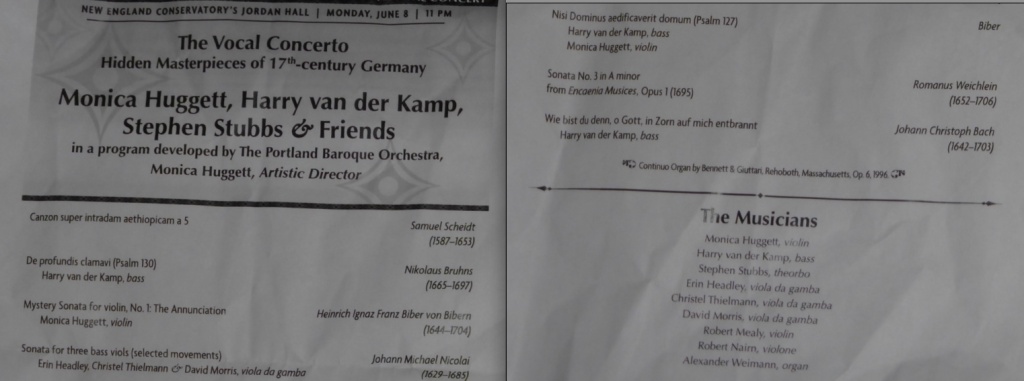
The Boston Early Music Festival started this past Sunday, and for me, two concerts so far: The Vocal Concerto on monday night and Concerto Soave this afternoon. Since I signed up without knowing much the repertoire or the programs, it was a surprise each time. Last night was more a balance between baroque violin and voice (a bass) and this afternoon was much more similar to the recital I heard last month with Sara Mingardo, both in repertoire as well as make-up: Italian 16-17th centuries works by Barbara Strozzi and others, 1 voice + harpsichord/organ + harp (in place of theorbo). For the record, I liked last night’s vocal work better.. even though this afternoon’s repertoire was pretty much the same as what Ms. Mingardo sang. And since it was a 1.5hour concert with a lot of singing, I had time to ponder what it is that can keep the audience attention for long stretches in works that they are not necessary familiar with (or even if they do..)
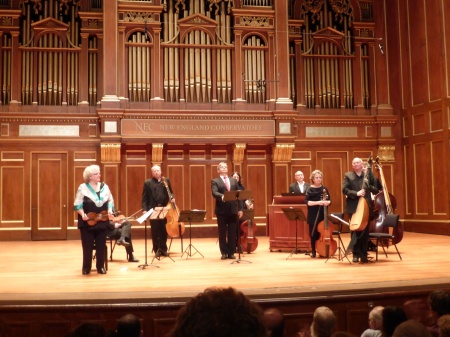
So, let’s make an attempt at it: musical phrasing (and repertoire? + selections?). I might draw some comparisons to also the two recitals I heard at Wigmore Hall, with Dorothea Röschmann and Sara Mingardo, and today with María Cristina Kiehr. But first, let’s have a listen to her in something my ears are more attuned to: (look who passed off the music!)
My first impression at Jordan Hall (and 2nd impression listening to clip above) was what a warm and silky voice she has! Extremely soothing! Her takes on two specific works: (1) “Amico, hai vinto” by Sigismondo d’India before the break and (2) “O che felice giorno” by Caccini, where she sang only to very quiet and lovely harp accompaniment, were to me the highlight of the afternoon. It’s unfortunate that as she started (1) there was some persistent ringing and everyone had to stop twice to investigate.. but even before the unexpected pause I heard exactly what I love: phrasing! and she picked up exactly where she left off post-pause, full of emotion: shaping, dynamics+intensity. Whatever it was about, I wanted to hear more! In fact I was secretly hoping she would re-start from the beginning :-), but that’s asking too much. As for (2), with only solo harp accompanying, there were a lot of very nice and soft singing, shaping, long sustaining notes.
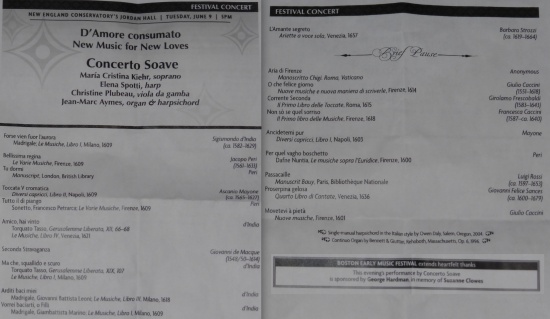
These two pieces, in addition to also the piece by Barbara Strozzi where there was more interesting developments than a simple and short song, occupied probably around 30 minutes maximum. That left about 1 hour of singing where I had enough time to hear and brainstorm my home-made vocabulary to describe music as well as opinion for what constitute an affective/exciting recital 🙂 . This is a windy way of saying I wanted to hear more dynamics and phrasings. In fact, she used her hands a lot (as well as eyes, fingers, eyebrows) to “shape” her phrasing, and I wished the voice was also part of it. What do I mean? There were hints at times that she’s singing something “angry” or “frustrated” or “sad”, but the range of emotion still falls within the mellow and too soothing and nice category. In addition, she didn’t use the full range of dynamics (intensity) in a lot of songs (similar to how i hear her in the clip above, although she does phrase!).
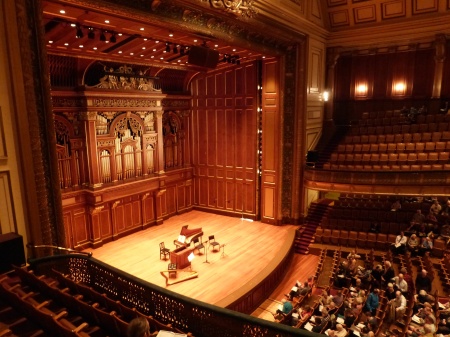
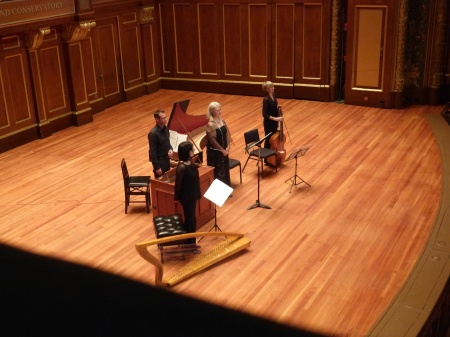
Independently, since the harp was there with some truly lovely sound, I think we can start there to build up my home-made musical vocabulary: (1) tone, (2) shade, (3) color, (4) dynamics, (5) shaping, (6) phrasing . (Incidentally, the harp has a very clear register BREAK between the high and low notes and nobody seems to care! and yet some are hell-bent on that when it comes to human voices, how interesting.) Feel free to let me know if I have been using wrong terminology all this time..
(1) tone: if we line up 6 sopranos to sing a note they all sound different, their individual sound is what I call “tone”.
(2) shade: for a same note, you can hear when a singer “shades” it to make darker / lighter to fit the mood/feeling
(3) color: this i associated more with the varying of the voice up and down the scale, such that in some range (and depending on their shading) they can be compared to 1 instrument and yet in another range they sound like a different one, e.g., a flute on high, clarinet in mid-range, basoon in lower range.
(4) dynamics (intensity): pianissimo ppp to forte fff
(5) shaping: this I associate more with pronunciation, how to “shape” a word around some musical notes. To be *very* precise, VK explained it exactly here with the “ò” in farò. Also note how she prolongs her upward “ò” as opposed to abruptly stops in the downward one. This is what I sometimes termed “abrupt ending” or “truncated” “instead of finishing” in my description.
(6) phrasing: Finally, putting EVERYTHING together, and taking into account also the meaning of the whole phrase *and* breathing. You will forgive me for citing VK again as she demonstrated how much attention can be paid to this single phrase “Sarò qual più ti piace” within the 10-min aria:
I think it is clearly not a coincidence that we (some of us) grab on to the edge of our seats and intently listen with eyes wide opened when Dorothea Röschmann, Vesselina Kasarova, or Anja Harteros sings. You could lump it into our blind “devotion” but I disagree 😉 ; they really shape / phrase the music such that every piece is interesting, riveting, full of suspense or anguish, and we simply spring to our feet clapping or remained glued to the seat unable to move (and desire more). Interestingly, for me, Sara Mingardo doesn’t fall all the way into the category of singers above. I’m not sure if it’s mainly the repetoire she’s singing in.. but she’s simply instinctive with dynamics, breathing, shaping, and phrasing in whatever she sings in, such that it simply works in the sense of music for me *most* of the time (that and the gorgeously sexy attractive tone, although in my definition she doesn’t possess as many color as VK, in fact not many singers have that range of colors that VK possesses.)
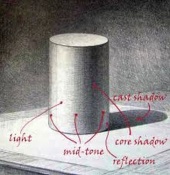
Example 1: S’agita in mezzo all’onde. This aria has not much to do with anything, it’s a big picture scene, with the settings taking place in the recitative just before that: Polifemo had just beaten up Aci, and Galatea first tells him what a brute he is and nothing he does shakes her, then follows up with this lovely tune. What I find most interesting here is that there is the music underneath, and I’m assuming they’re all singing to the same notes, yet the tune, which i can weed out very clearly in (a) is tangled up with phrasing/breathing/pronunciations in many occasions in (b) and (c) such that it breaks the musical flow. (Do we care? may be i put too much emphasis on this… Right, there’s also the thing about “excessive ornamentation”..).
(a) S. Mingardo, as I have already posted her live dvd version before, let’s have a listen to her cd-recording with Emmanuelle Haïm and her orchestra Le Concert d’Astrée.
(b) D. Galou, live
(c) S. Prina, live
Example 2: “He was despised and rejected” . Eyes mentioned once to me she also loved Ms. Connolly’s take. And to my surprise I found it extremely similar to Ms. Mingardo’s take (are my ears shot?), and thus they simply work for my brain! Again, the case with Ms. Galou is somehow again the words getting in the way. This is of course very subjective and simply meant to explain how it works for my brain. Perhaps I’m also trying to address the point of clear pronunciation versus musical phrasing with this set of clips.
(d) S. Mingardo, live
(e) S. Connolly, live
(f) D. Galou, live

Leave a comment